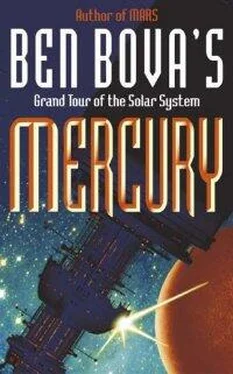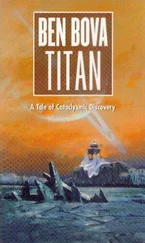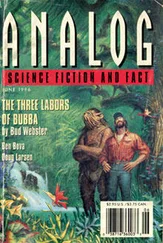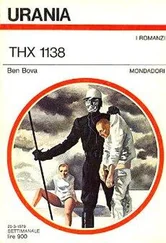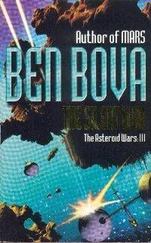Ben Bova - Mercury
Здесь есть возможность читать онлайн «Ben Bova - Mercury» весь текст электронной книги совершенно бесплатно (целиком полную версию без сокращений). В некоторых случаях можно слушать аудио, скачать через торрент в формате fb2 и присутствует краткое содержание. Год выпуска: 2005, ISBN: 2005, Издательство: Hodder & Stoughton, Жанр: Космическая фантастика, на английском языке. Описание произведения, (предисловие) а так же отзывы посетителей доступны на портале библиотеки ЛибКат.
- Название:Mercury
- Автор:
- Издательство:Hodder & Stoughton
- Жанр:
- Год:2005
- ISBN:978-0-340-82395-8
- Рейтинг книги:4 / 5. Голосов: 1
-
Избранное:Добавить в избранное
- Отзывы:
-
Ваша оценка:
- 80
- 1
- 2
- 3
- 4
- 5
Mercury: краткое содержание, описание и аннотация
Предлагаем к чтению аннотацию, описание, краткое содержание или предисловие (зависит от того, что написал сам автор книги «Mercury»). Если вы не нашли необходимую информацию о книге — напишите в комментариях, мы постараемся отыскать её.
Mercury — читать онлайн бесплатно полную книгу (весь текст) целиком
Ниже представлен текст книги, разбитый по страницам. Система сохранения места последней прочитанной страницы, позволяет с удобством читать онлайн бесплатно книгу «Mercury», без необходимости каждый раз заново искать на чём Вы остановились. Поставьте закладку, и сможете в любой момент перейти на страницу, на которой закончили чтение.
Интервал:
Закладка:
One of the street missionaries from the storefront New Morality branch found Danvers huddled in the gutter, bleeding and sobbing. He took Danvers in, dressed his wounds, fed his body and spirit, and turned his gratitude into a life of service. At twenty he entered a New Morality seminary. By the time he was twenty-two, Elliott Danvers was an ordained minister, ready to be sent out into the world in service to God. He was never allowed to return to his old Detroit neighborhood. Instead he was sent overseas and saw that there were many wretched people around the globe who needed his help.
His rise through the hierarchy was slow, however. He was not especially brilliant. He had no family connections or well-connected friends to help push him upward. He worked hard and took the most difficult, least rewarding assignments in gratitude for the saving of his life.
His big chance came when he was assigned as spiritual counselor to the largely Latin-American crew building the skytower in Ecuador. The idea of a space elevator seemed little less than blasphemous to him, a modern-day equivalent to the ancient Tower of Babel. A tower that reached to the heavens. Clearly technological hubris, if nothing else. It was doomed to fail, Danvers felt from the beginning.
When it did fail, it was his duty to report to the authorities on who was responsible for the terrible tragedy. Millions of lives had been lost. Someone had to pay.
As a man of God, Danvers was respected by the Ecuadorian authorities. Even the godless secularists of the International Astronautical Authority respected his supposedly unbiased word.
Danvers phrased his report very carefully, but it was clear that he—like most of the accident investigators—put final blame on the leader of the project, the man who was in charge of the construction.
The project leader was disgraced and charged with multiple homicide. Because the international legal system did not permit capital punishment for inadvertent homicide, he was sentenced to be banished from Earth forever.
Danvers was promoted to bishop, and—after another decade of patient, uncomplaining labor—sent to be spiritual advisor to the small crew of engineers and technicians working for the Sunpower Foundation building solar power satellites at the planet Mercury.
He was puzzled about the assignment, until his superiors told him that the director of the project had personally asked for Danvers. This pleased and flattered him. He did not realize that the fiery-eyed Dante Alexios, running the actual construction work on the hell-hot surface of Mercury, was the young engineer who had been in charge of the skytower project, the man who had been banished from Earth in large part because of Danvers’s testimony.
FIELD TRIP
Victor Molina licked his lips nervously. “I’ve never been out on the surface of another world before,” he said.
Dante Alexios put on a surprised look. “But you told me you’ve been to Jupiter’s moons, didn’t you?”
The two men were being helped into the heavily insulated spacesuits that were used for excursions on Mercury’s rocky, Sun-baked surface. Half a dozen technicians were assisting them, three for each man. The suits were brightly polished, almost to a mirror finish, and so bulky that they were more individual habitats than normal spacesuits.
Molina’s usual cocky attitude had long since vanished, replaced by uncertainty. “I was at Europa, yeah,” he maintained. “Most of the time, though, I was in the research station Gold, orbiting Jupiter. I spent a week in the smaller station in orbit around Europa itself but I never got down to the surface.”
Alexios nodded as the technicians hung the life-support package to the back of his suit. Even in Mercury’s light gravity it felt burdensome. Both men’s suits were plugged into the base’s power system, mainly to keep the cooling fans running. Otherwise they would already be uncomfortably hot and sweaty inside the massive suits.
He knew that Molina had never set foot on the surface of another world. Alexios had spent years accumulating a meticulous dossier on Victor Molina, the man who had once been his friend, his schoolmate, the buddy he had asked to be his best man when he married Lara. Molina had betrayed him and stolen Lara from him. Now he was going to pay.
It took two technicians to lift the thick-walled helmet over Molina’s head and settle it onto the torso ring, like churchmen lowering a royal crown on an emperor. As they began sealing the helmet, two other techs lowered Alexios’s helmet, muffling all the sounds outside. Strange, Alexios thought. We don’t really notice the throbbing of the base’s pumps and the hiss of the air vents until the sound stops. Through his thick quartz visor he could see the technicians fussing around Molina’s suit, and the serious, almost grim expression on the astrobiologist’s face. Once we pull down the sun visors I won’t be able to see his face at all, Alexios knew.
He moved his arm with a whine of servomotors and pressed the stud on his left wrist that activated the suit’s radio.
“Can you hear me, Dr. Molina?”
For a moment there was no reply, then, “I hear you.” Molina’s voice sounded strange, preoccupied.
The woman in charge of the technicians at last gave Alexios a thump on the shoulder and signaled a thumbs-up to him. He switched to the radio frequency for the base’s control center:
“Molina and Alexios, ready for surface excursion.”
“You are cleared for excursion,” came the controller’s voice. Alexios recognized it; a dour Russian whom he sometimes played chess with. Once in a while he even won.
“Cameras on?” Alexios asked, as he started clumping in the heavy boots toward the airlock hatch.
“Exterior cameras functioning. Relief crew standing by.”
Two other members of the base’s complement had suited up at the auxiliary airlock and were prepared to come out to rescue Alexios and Molina if they ran into trouble. Neither the main airlock nor the auxiliary was big enough to hold four suited people at the same time.
The inner airlock hatch swung open. Alexios gestured with a gloved hand. “After you, Dr. Molina.”
Moving uncertainly, hesitantly, Molina stepped over the hatch’s sill and planted his boots inside the airlock chamber. Alexios followed him, almost as slowly. One could not make sudden moves in the cumbersome suits.
Once the inner hatch closed again and the air was pumping out of the chamber, Molina said, “It’s funny, but over this radio link your voice sounds kind of familiar.”
Alexios’s pulse thumped suddenly. “Familiar?”
“Like it’s a voice I know. A voice I’ve heard before.”
Will he recognize me? Alexios wondered. That would ruin everything.
He said nothing as the panel lights indicated the airlock chamber had been pumped down to vacuum. Alexios leaned a hand on the green-glowing plate that activated the outer hatch. It swung outward gradually, revealing the landscape of Mercury in leisurely slow motion. Molten sunlight spilled into the airlock chamber as both men automatically lowered their sun visors.
“Wow,” said Molina. “Looks freaking hot out there.”
Alexios got a vision of the astrobiologist licking his lips. Molina stayed rooted inside the chamber, actually backing away slightly from the sunshine.
“It’s wintertime now,” Alexios joked, stepping out onto the bare rocky surface. “The temperature’s down below four hundred Celsius.”
“Wintertime.” Molina laughed shakily.
“When you step through the hatch, be careful of your radiator panels. They extend almost thirty centimeters higher than the top of your helmet.”
“Yeah. Right.”
Molina finally came out into the full fury of the Sun. All around him stretched a barren, broken plain of bare rock, strewn with pebbles, rocks, boulders. Even through the heavily tinted visor, the glare was enough to make his eyes tear. He wondered if the suit radio was picking up the thundering of his pulse, the awed gushing of his breath.
Читать дальшеИнтервал:
Закладка:
Похожие книги на «Mercury»
Представляем Вашему вниманию похожие книги на «Mercury» списком для выбора. Мы отобрали схожую по названию и смыслу литературу в надежде предоставить читателям больше вариантов отыскать новые, интересные, ещё непрочитанные произведения.
Обсуждение, отзывы о книге «Mercury» и просто собственные мнения читателей. Оставьте ваши комментарии, напишите, что Вы думаете о произведении, его смысле или главных героях. Укажите что конкретно понравилось, а что нет, и почему Вы так считаете.
